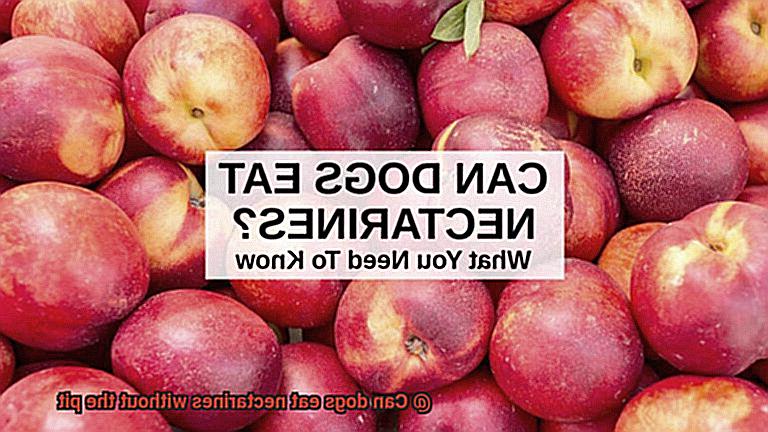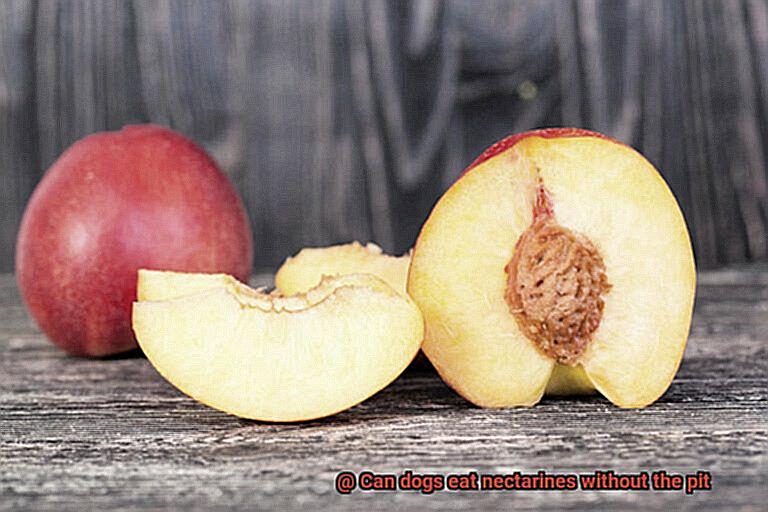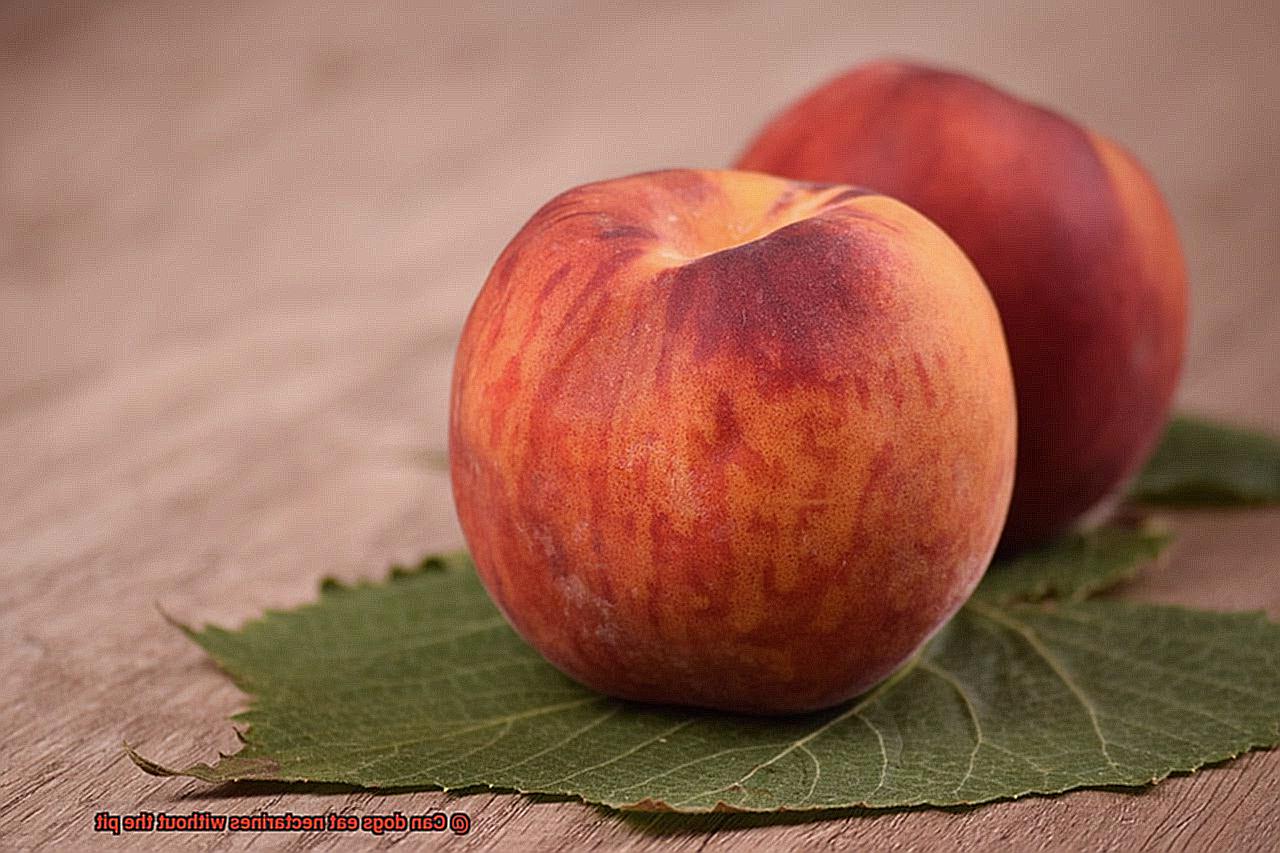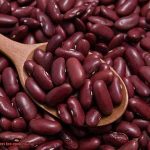Can dogs eat nectarines without the pit?
Get ready to sink your teeth into a juicy topic: nectarines. We all know how much our furry friends love treats, but when it comes to fruits, we need to be extra careful.
Today, we’re tackling the burning question: can dogs safely indulge in nectarines minus the pit? Picture this: the sun is shining, and you’re munching on a delectable nectarine with its vibrant colors and irresistible scent.
But what about Fido? Are these summertime delights safe for our four-legged pals?
It’s time to separate fact from fiction and discover if nectarines are truly a tail-wagging addition to your dog’s diet.
Benefits of Feeding Nectarines to Dogs
Contents
- 1 Benefits of Feeding Nectarines to Dogs
- 2 Potential Choking Hazards and Intestinal Blockages
- 3 How to Feed Nectarines to Your Dog Safely
- 4 Considerations for Dogs With Sensitivities or Allergies
- 5 Selecting Ripe and Mold-Free Nectarines
- 6 Moderation is Key When Feeding Nectarines
- 7 Potential Health Issues From Eating Too Much Fruit
- 8 Consulting with a Veterinarian Before Introducing New Foods
- 9 Conclusion
That includes providing them with a balanced and nutritious diet. While it’s important to stick to dog-friendly foods, there are some fruits that can offer health benefits when fed in moderation. One such fruit is the nectarine. In this article, we will explore the benefits of feeding nectarines to your French Bulldog and provide some crucial tips for safe consumption.
Boosts Immune System:
Nectarines are packed with essential vitamins like A, C, and E. These vitamins play a vital role in maintaining a healthy immune system in dogs, helping to protect against infections and promote overall well-being.
Aids Digestion:
The high fiber content in nectarines can aid digestion and prevent constipation in dogs. It promotes regular bowel movements and helps maintain a healthy digestive tract, ensuring your French Bulldog’s tummy stays happy and comfortable.
Powerful Antioxidants:
Nectarines contain antioxidants that fight against harmful free radicals in your dog’s body. By neutralizing these free radicals, antioxidants help reduce the risk of various health issues and contribute to your French Bulldog’s overall well-being.
Natural Energy Boost:
The natural sugars found in nectarines provide a quick source of energy for active dogs or those participating in strenuous activities. These natural sugars can be a healthier alternative to processed treats while still offering a sweet and enjoyable flavor.
Weight Management:
If your French Bulldog needs to manage their weight, nectarines can be a satisfying low-calorie treat option. With their delicious taste and low fat content, they can be incorporated into your dog’s diet without worrying about excessive calories.
Important Notes:
- Remove the pit: Always remove the pit before feeding nectarines to your French Bulldog. The pit contains cyanide, which is toxic to dogs if ingested.
- Start with small amounts: As with any new food, start with small amounts and monitor your dog for any adverse reactions or sensitivities.
- Consult your veterinarian: Before making any significant changes to your dog’s diet, it’s always best to consult with a veterinarian. They can provide personalized guidance based on your French Bulldog’s specific needs.
Potential Choking Hazards and Intestinal Blockages

We all love to spoil our French Bulldogs with delicious treats, but it’s important to be aware of potential choking hazards and intestinal blockages that can arise from certain foods. One such food is the nectarine pit. As an expert in pet health and safety, I want to share my knowledge and experience to help you keep your furry friend out of harm’s way.
Choking Hazards: Pit Problems
Nectarine pits are hard and smooth, making them difficult for dogs to chew and swallow. If your French Bulldog accidentally ingests a nectarine pit, it can become lodged in their throat, leading to choking. This can be a terrifying situation for both you and your pup.
Intestinal Blockages: A Pitfall to Avoid
But wait, there’s more. Nectarine pits can also cause intestinal blockages if swallowed by dogs. The shape and size of the pit can make it challenging for your dog’s digestive system to pass it through. This can result in an obstruction in their intestines, causing pain and putting their life at risk.
Recognizing the Red Flags
To protect your French Bulldog from these dangers, it’s crucial to know the signs of a potential choking hazard or intestinal blockage. Watch out for difficulty breathing, coughing or gagging, excessive drooling, vomiting, abdominal pain, loss of appetite, and changes in bowel movements. If your pup exhibits any of these symptoms after consuming a nectarine pit or any foreign object, don’t delay – seek immediate veterinary attention.
Prevention is Paw-some.
As they say, an ounce of prevention is worth a pound of cure. So let’s avoid these pitfalls altogether. Here are some practical tips to keep your French Bulldog safe:
- Remove the pit before offering nectarines to your pooch.
- Discard the pit in a secure trash bin where your dog can’t access it.
- Always supervise your dog while they’re enjoying their fruity treats.
When in Doubt, Reach Out.
If you suspect that your French Bulldog has swallowed a nectarine pit or any foreign object and is showing signs of choking or intestinal blockage, don’t try to play surgeon yourself. Instead, contact your veterinarian immediately for expert guidance on what to do next. Remember, your pup’s safety is top priority.
Surgery: A Last Resort
In some cases, surgery may be necessary to remove an intestinal blockage. This can be a costly and invasive procedure, so let’s do our best to prevent it by keeping those nectarine pits out of reach.
How to Feed Nectarines to Your Dog Safely
Nectarines are a delicious and nutritious fruit that many humans enjoy, but can our French Bulldogs also safely enjoy this juicy treat? The answer is yes, but there are some precautions to keep in mind. In this guide, we will explore how to safely feed nectarines to French Bulldogs, ensuring their well-being and enjoyment.
Removing the Pit: A Crucial Step
Before feeding your French Bulldog nectarines, it is crucial to remove the pit. The pit contains a hard shell that can be a choking hazard and may cause intestinal blockage if swallowed. Always make sure to take out the pit before giving nectarines to your furry friend.
Moderation is Key: Avoid Overindulgence
While French Bulldogs can enjoy nectarines, it’s important to remember that moderation is key. Nectarines contain natural sugars and can be slightly acidic, so too much can lead to digestive upset or an upset stomach. Start by offering small pieces as a treat or part of their regular diet.
Monitor for Allergic Reactions
Every dog is unique, and some may have sensitivities or allergies to certain fruits, including nectarines. Watch out for signs of itching, swelling, vomiting, or diarrhea after introducing nectarines into your French Bulldog’s diet. If any of these symptoms occur, discontinue feeding nectarines and consult with your veterinarian.
Nectarines as a Supplement, Not a Replacement
While nectarines are generally safe for French Bulldogs, they should not replace a balanced diet. Dogs have specific nutritional needs that are best met through a complete and balanced dog food. Nectarines should be offered as an occasional treat or supplement to their regular meals.
Pesticide Precautions: Wash and Choose Organic
Like many fruits, nectarines are often treated with pesticides. These can be harmful to dogs if ingested in large amounts. Wash the nectarines thoroughly before offering them to your French Bulldog or consider purchasing organic nectarines to reduce the risk of pesticide exposure.
Considerations for Dogs With Sensitivities or Allergies
French Bulldogs are known for their adorable wrinkles and playful personalities, but what happens when your furry friend has sensitivities or allergies? It’s important to take extra care when it comes to their diet, including the introduction of new foods like nectarines. In this section, we will explore the considerations for feeding nectarines to dogs with sensitivities or allergies.
- Know your dog’s sensitivities or allergies: Before introducing any new food into your dog’s diet, it’s crucial to be aware of any existing sensitivities or allergies they may have. This will help you avoid potential adverse reactions and keep your pup healthy and happy.
- Nutritional benefits of nectarines: Nectarines are packed with nutrients that can benefit dogs, such as vitamins A and C, fiber, and antioxidants. However, not all dogs may tolerate these fruits well, so it’s important to proceed with caution.
- Watch out for symptoms: Some dogs may have sensitivities to certain fruits, including nectarines. If your dog experiences symptoms such as itching, diarrhea, or vomiting after consuming nectarines, it’s best to avoid feeding them this fruit altogether.
- Consult with your veterinarian: Always consult with your veterinarian before introducing any new food into your dog’s diet, especially if they have known sensitivities or allergies. Your vet can provide guidance on whether nectarines are safe for your dog based on their individual health needs and dietary restrictions.
- Remove the pit: If your veterinarian approves the inclusion of nectarines in your dog’s diet, it’s essential to remove the pit before offering the fruit to your pet. The pit can pose a choking hazard and may contain harmful substances that could be toxic to dogs if ingested.
- Supervise your dog while eating: It’s crucial to always supervise your dog while they are eating nectarines or any other food to prevent any potential accidents or health risks. This will ensure their safety and well-being.
- Moderation is key: Remember that moderation is key when it comes to feeding fruits to dogs. Too much fruit consumption can lead to digestive issues or an upset stomach. It’s important to offer nectarines as a supplement to their regular diet, not as a replacement.
- Allergic reactions and behavior changes: If you notice any adverse reactions or changes in your dog’s behavior after consuming nectarines, such as excessive itching, difficulty breathing, or unusual lethargy, contact your veterinarian immediately for further guidance and assistance.
Selecting Ripe and Mold-Free Nectarines
French bulldogs are known for their adorable wrinkly faces and playful personalities. As a responsible pet owner, you want to make sure you’re providing them with the best nutrition and occasional treats. Nectarines can be a tasty and refreshing snack for your furry friend, but it’s essential to select ripe and mold-free ones. In this guide, we’ll explore expert tips to ensure you choose the perfect nectarines for your French bulldog.
Sniff Out the Sweetness:
To determine if a nectarine is ripe, give it a gentle sniff near the stem end. If it has a fragrant aroma, akin to summer sunshine, it’s likely sweet and ready to enjoy. Remember, your Frenchie has an excellent sense of smell too, so they’ll appreciate the tantalizing scent.
Squeeze for Ripeness:
When you gently squeeze a nectarine, it should yield slightly without being mushy or overly soft. This slight give indicates that the fruit is ripe and juicy, making it an ideal choice for your French bulldog’s enjoyment.

Mind the Mold:
Mold can pose health risks to your French bulldog if consumed, so it’s crucial to inspect each nectarine for any signs of mold growth before sharing it with your furry friend. Look out for visible patches of mold, discoloration, or a fuzzy texture on the skin. If you spot any of these indicators, it’s best to discard the nectarine and find a fresh one.
Organic Options:
Opting for organic nectarines may reduce the risk of pesticide exposure for your French bulldog. While they are generally safe to consume in small quantities, organic produce provides an added layer of reassurance. However, remember that even organic nectarines can still harbor mold, so thorough inspection is essential regardless.
Size Matters:
When feeding nectarines to your French bulldog, moderation is key. While these fruits are generally safe for dogs, feeding them large quantities or sharing an entire fruit may lead to digestive issues like upset stomach or diarrhea. Instead, offer small pieces as an occasional treat, ensuring your Frenchie’s tummy stays happy.
Wash It Well:
Before serving a nectarine to your French bulldog, make sure to wash it thoroughly under running water. This step helps remove any dirt, pesticides, or other residues that may be present on the skin, ensuring a clean and safe snack for your furry friend.
Moderation is Key When Feeding Nectarines
French Bulldogs are beloved companions known for their playful nature and distinctive appearance. As responsible pet owners, we want to ensure that our furry friends receive a balanced diet that includes occasional treats. Nectarines, with their sweet and juicy flavor, can be a tempting option. However, it is essential to exercise moderation when feeding nectarines to French Bulldogs to keep them safe and healthy.
Safety First: Remove the Pit.
As mentioned earlier, the pit of a nectarine contains a small amount of cyanide, which can be toxic to dogs if ingested in large quantities. To avoid any mishaps, always remove the pit before offering nectarines to your French Bulldog.

Health Benefits in Moderation:
Nectarines, when given in moderation, can provide some health benefits for your French Bulldog. They are rich in vitamins A and C, which support a robust immune system and promote healthy skin and coat. Additionally, the dietary fiber found in nectarines aids digestion. However, remember that nectarines should only be given as an occasional treat and not as a substitute for a balanced diet.
Monitor for Sensitivities:

Just like humans, dogs can have sensitivities or allergies to certain foods, including fruits like nectarines. When introducing nectarines to your French Bulldog’s diet, start with small portions and closely monitor their reaction. Look out for signs of gastrointestinal upset such as vomiting or diarrhea. If any adverse symptoms occur, discontinue feeding nectarines and consult your veterinarian.
Wash Thoroughly:
To ensure the safety of your French Bulldog, always wash nectarines thoroughly before serving them. Like other fruits, nectarines may have pesticides or other chemicals on their skin that can be harmful to dogs. Washing the fruit with water can help remove any potential toxins and reduce the risk of adverse reactions.
Consult Your Veterinarian:
Before making any significant changes to your French Bulldog’s diet, it is crucial to consult with your veterinarian. They can provide personalized advice based on your dog’s specific needs and health condition. Your vet can recommend appropriate portion sizes and frequency of nectarine consumption based on your French Bulldog’s size, age, and activity level.
Potential Health Issues From Eating Too Much Fruit
French Bulldogs are adorable and playful companions, but they also have unique dietary needs. While nectarines may seem like a delightful treat for your furry friend, it’s important to be cautious about how much fruit you give them.
Consuming excessive amounts of fruit can lead to potential health issues that we need to be aware of. Let’s take a closer look at these potential concerns:
Weight Gain and Obesity:
Fruits, including nectarines, are high in natural sugars. If your French Bulldog consumes too much fruit, it can lead to weight gain and even obesity. Just like us humans, dogs need to maintain a healthy weight to avoid various health problems.
Dental Problems:
The high sugar content in fruits can also cause dental issues for your French Bulldog. Cavities and tooth decay can arise from eating too much fruit, so it’s essential to practice good dental hygiene and monitor their fruit intake.
Gastrointestinal Upset:
Some dogs, including French Bulldogs, have sensitive stomachs. Eating excessive amounts of fruit can lead to gastrointestinal upset, such as diarrhea and vomiting. It’s important to introduce new foods gradually and monitor how your furry friend reacts.
Digestive Issues:
While fiber is generally beneficial for dogs, consuming too much can lead to digestive issues such as bloating and gas. Nectarines contain fiber, so it’s important to moderate your French Bulldog’s intake to avoid any discomfort.
Nutritional Imbalance:
Nectarines, like other fruits, contain various vitamins and minerals that are essential for dogs’ overall health. However, an excessive intake of these nutrients can upset the nutritional balance in their diet. It’s crucial to provide a well-balanced diet with a variety of food sources.
Pre-existing Health Conditions:
If your French Bulldog has pre-existing health conditions such as diabetes or pancreatitis, it’s best to avoid giving them large quantities of fruit. The high sugar content can be detrimental to their condition and lead to further health complications.
Choking Hazard:
Lastly, it’s crucial to never give your French Bulldog the pit of a nectarine or any other stone fruit. The pit poses a choking hazard, and it also contains potentially toxic substances that can harm your furry friend.
Remember, each dog is unique, and their dietary needs may vary. If you notice any adverse symptoms after your French Bulldog consumes nectarines or any other fruit, consult with a veterinarian for guidance. Your trusted vet can provide tailored advice based on your furry friend’s individual needs and help ensure their overall well-being.
Consulting with a Veterinarian Before Introducing New Foods
We know how much you love your furry friends and want to give them the best of everything, including tasty treats like nectarines. But before you start sharing this juicy fruit with your Frenchie, it’s crucial to consult with a veterinarian. Here’s why:
Tailoring to Your Frenchie’s Needs
Just like humans, dogs have different dietary needs and sensitivities. What works for one pup may not work for another. By consulting with a vet, you can get personalized advice on whether nectarines are suitable for your Frenchie. They’ll evaluate your dog’s overall health and consider factors like allergies, medical conditions, and current diet.
Avoiding Digestive Upsets
While nectarines may seem harmless, some fruits can cause gastrointestinal issues in dogs. The unique digestive system of our four-legged pals may not handle certain fruits as well as ours do. A vet can determine if nectarines are safe for your Frenchie and recommend appropriate serving sizes to avoid any tummy troubles.
Pit Problems
Did you know that the pit of a nectarine can be a choking hazard? It’s true. That’s why it’s crucial to always remove the pit before sharing a nectarine with your Frenchie. A vet will remind you of this important safety measure and ensure that your pup stays out of harm’s way.
Sugar Sensitivity
Nectarines contain natural sugars, which can lead to weight gain or other health issues if consumed excessively. Dogs with conditions like diabetes or pancreatitis may need to avoid nectarines altogether due to their sugar content. Your vet can provide guidance based on your Frenchie’s specific needs and help you make the right decisions regarding their diet.
Allergy Awareness
Just like humans, dogs can have allergies or sensitivities to certain fruits. While nectarines are generally safe for dogs, it’s essential to watch out for any adverse reactions. A vet can help identify potential risks and guide you on how to introduce nectarines gradually into your Frenchie’s diet.
Remember, your vet is your ultimate partner in ensuring your Frenchie’s health and happiness. They will provide you with accurate and reliable information tailored to your specific dog’s needs. So, before you go ahead and share that nectarine with your Frenchie, set up a consultation with your vet and make sure you’re making informed decisions about their diet.
F3KL9McNjz8″ >
Conclusion
In conclusion, it is safe for dogs to eat nectarines without the pit.
However, it is important to remember that moderation is key. Nectarines can be a tasty and nutritious treat for your furry friend, packed with vitamins and minerals.
So go ahead and share a juicy nectarine slice with your canine companion, but always keep an eye on their portion sizes and overall diet.




